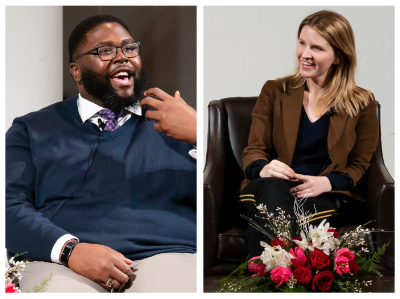
She was speaking of her survivalist parents in Idaho, who appear in her #1 New York Times best-selling memoir, 2018’s Educated. They distrust most mainstream institutions—the government, hospitals, schools—and her own homeschooling was scattershot. She’d never heard of the U.S. civil rights movement, for instance, until she went to Brigham Young University, which admitted her on scholarship.
Westover came to campus on Feb. 6 for an event with Anthony A. Jack ’07. The two are friends at Harvard. Jack, a sociologist, is an assistant professor of education there and the author of 2019’s acclaimed book, The Privileged Poor: How Elite Colleges Are Failing Disadvantaged Students. Westover is a senior research fellow at Harvard’s Shorenstein Center.
Westover told the audience she was compelled to write about the power of education, and realized her story could carry that story. Jack wanted to right a wrong: “When I first saw people write about first-generation and low-income college students, I thought, ‘They get the story about half-right.’ I was inheriting the consequences of people who were setting policy at colleges and universities but were not dealing with the full complexity of understanding our experiences.”
The event’s moderator was Leah Schmalzbauer, the William R. Kenan Professor of American Studies and Sociology. She posed questions generated by students in her course “Unequal Childhoods: Race, Class and Gender in the United States,” who read both Educated and The Privileged Poor.
Jack spoke of his family’s full-blast emphasis on getting him admitted to college, but how he and they hadn’t thought of what came after that: “The first-generation college student experience evokes the immigrant narrative, in that you’re leaving one culture for another.”
Schmalzbauer asked how their hometowns shaped the way they think about education and equality. Jack, who grew up in Miami, recalled the traumas of place: the sound of gunshots, the daily grind of hypervigilance, how when you walk to school “you have to keep your head on swivel.” He added: “It’s hard to concentrate on work when you have this fight-or-flight as your norm.” Now he sees the larger forces at work, how African Americans were clustered together by redlining, for instance.
Westover said that in rural areas, “it’s often less about inequality in that town, but more that the whole ecosystem has had no or little growth because of the changing nature of the economy.” A generation ago, most Idaho kids would have grown up to be farmers, she said, but that’s no longer a viable profession: “This whole chunk of the country thinks the future is not for them.” She lamented the reductionist depiction of rural areas, which mostly appear on TV as crime scenes, “with weird rural people, and the CSI people from the city who solve the case.”
Westover also gave advice to students on how to approach their education: “Self-empathy is not
arrogance or indulgence.”
Photos by Jiayi Liu